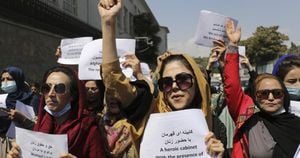Saudi Arabia’s Crown Prince Mohammed bin Salman has made headlines worldwide with accusations of "genocide" against Israel, signaling significant tension amid the continuing conflict between Israel and Hamas. Speaking at a notable summit of Islamic leaders held on November 12, 2024, the de facto ruler of Saudi Arabia stated, "The Kingdom reiterates its condemnation and absolute refusal of the collective genocide committed by Israel against the brotherly Palestinian people." This stark condemnation reflects rising sentiments among various Arab nations concerning the civilian toll of the conflict, particularly since the onset of heightened military actions last year.
The summit was jointly convened by the Arab League and the Organization of Islamic Cooperation (OIC) to address the worsening situations not only in Gaza but also Lebanon. The meeting brought together key Muslim and Arab leaders to deliberate on strategies to halt Israeli aggression and affirm support for Palestinians. Amidst these discussions, the Saudi Foreign Minister, Faisal bin Farhan Al Saud, had previously outlined the agenda to focus on the Israeli actions and their impacts, reinforcing the Kingdom’s stance as it pushes for international solidarity.
The situation on the ground has been dire. According to reports, over 43,000 people have died since Israel's aggressive military operations began against Gaza, which was triggered by Hamas' incursion on October 7, 2023. The violence has disproportionately affected civilians, with countless families caught between the crossfire. Just on the eve of Crown Prince Mohammed's statements, at least 30 individuals were reported killed, raising the despair among those watching the horrific toll of this conflict.
Bin Salman’s rhetoric is noteworthy, particularly following recent diplomatic efforts aimed at normalizing relations with Israel — pursuits influenced heavily by the U.S. administration’s interest. Last year, these negotiations seemed on the brink of historic success; they would have provided Israel with newfound legitimacy across the Arab world, contingent upon the establishment of Palestinian statehood. Yet, as the humanitarian crisis deepens, and conditions worsen, these diplomatic overtures appear to have collapsed.
This recent wave of harsh criticisms from Saudi leadership not only seeks to align with broader Arab sentiments but also reflects MBS’s revisions of policy concerning Iran. Saudi officials have called for international respect for Iranian sovereignty during their critiques of Israel, signaling complex dynamics where regional rivalries complicate alliances.
The backdrop of these statements could alter the geopolitical chessboard dramatically. The Crown Prince’s accusations have reignited calls for global action against Israel, urging the international community to intervene and halt military operations. This tallies with discussions surrounding potential moves to push Israel’s membership standing at the UN to the forefront—not as yet achievable but indicative of the boiling frustrations among Muslim and Arab nations.
At the summit, Arab League Secretary-General Ahmed Aboul Gheit suggested potential motions to freeze Israel's membership at the U.N. General Assembly—a bold statement to the diplomatic oceans coursing around the Middle East. He noted the potential for such initiatives, leveraging the collective sentiments of the member nations who are demanding accountability and action against perceived aggressions committed throughout this conflict.
The discussions also encompassed the need to halt arms deals with Israel and proposed actionable steps to bring the matter to international legal arenas. The dire humanitarian situation has spurred global response calls; figures and statistics of destruction continue to emerge—highlighting the almost entire displacement of Gaza's population, the hunger crisis, and rampant allegations of genocide aimed at Israel. These charges are vehemently denied by Israeli authorities.
Following the summit, wider discussions within the UN frameworks could see increased focus on human rights violations within combat zones, possibly galvanizing international scrutiny. The conditions for engaging with Israel alongside the Palestinian territories will continue to pose tough questions for trade, military supports, and alliances moving forward.
Mohammed bin Salman’s condemnations align with more radical voices across the region calling for unified responses against Israeli policies, hinting at long-term changes concerning relationship dynamics among Gulf nations.
The backdrop of this escalation showcases contrasting narratives, where MBS has oscillated from pursuing closer ties with Israel to openly backing Palestinian positions due to the unrest. The Crown Prince's evolution as he confronts the realities on the ground echoes broader uncertainties across the Gulf region as global powers seek roles amid oscillations for influence.
Each statement he releases rallies significant responses from fellow leaders, and the nature of this conflict transcends geopolitical lines as it invokes historical ties to the land.
Moving forward, the discourse dating back to the 2023 escalations continues to dominate regional relations, creating unease as world leaders assess the way forward among increasingly polarized positions. Calls from organizations, activists, and lawmakers are creating pressures to address these humanitarian crises as they seek actionable strategies for peace-building.
This moment marks another chapter, not just for Saudi-Israeli relations but amplifies the broader complexity surrounding the Middle Eastern geopolitical climate, enhancing the urgency for dialogue amid the calls for both ceasefires and humanitarian support systems.



